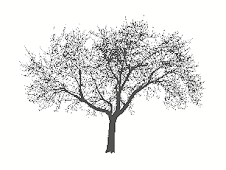Use the comments section to help one another out with plot questions or any other questions you have about "The Bear." I will check in periodically to comment as well.
For example: what's going on on pp. 198-220, as Ike is deciphering why Eunice, the slave, drowned herself?
Click to view larger version of family tree.




4 comments:
I thought it was interesting how McCaslin believed that the ownership of the land 'cursed' the South. On page 206, McCaslin states, "Don't you see? This whole land, the whole South, is cursed, and all of us who derive from it, whom it ever suckled, white and black both, lie under the curse?" Faulkner, through the character of McCaslin, is talking about the ravages of slavery during the 19th century and how the US was split through the concepts of slavery. The South was in ruins after the Civil War. Is this Faulkner just thinking of these past events or is he bashing society as a whole. McCaslin says that the curse has been removed from the white because of slavery and they are entering a new era. This just brings back questions of land ownership, not too unlike that of Thoreau and Leopold's views of land and property. Just thought that piece to be interesting.
Hey, great point, Eric! I'm glad you picked up on that, and we'll talk more about the connection between property and curses (and property AS a curse) tomorrow.
Given Faulkner's language of curses here I'm surprised you didn't make another Red Sox analogy...
Sections 4 & 5 left me a bit confused, but I was able to grasp some of the main themes that were prevalent, such as ownership. When Ike returns many years later, McCaslin grants him ownership of the land. However, he becomes very angry and almost offended by this because he believes that no one truly owns land. He says that God is the only one who has ownership over land because he created it. Ike then takes a stab at humanity in general stating that God "made the earth first and peopled it with dumb creatures"(190). Ike speaks in great detail about slavery, claiming that it is the result of people trying to own land. I was a bit confused with the slavery sections, especially the part about Eunice. It states that she was "bought" by her own father, which threw me off a bit. I wasn't completely sure of her significance in the story.
I was also confused by sections 4 and 5 of Faulkner’s story. One theme I did pick out what as struggle for identity. On page 198 it says “When he had learned to read, he would look up at the scarred and cracked backs and ends but with no particular desire to open them …he realized that they probably contained a chronological and much more comprehensive though doubtless tedious record…not only of his own flesh and blood but of all his people, not only the whites but the black ones too, who were as much a part of his ancestry as his white progenitors.” It’s as if he does not know which race to identify himself due to his diverse family tree. The beginning of section 4 also has a religious quality to it in the way they discuss events such as creation from the Old Testament. I felt as if there may have also been a connection between the family tree of Abraham and McCaslin yet I could quite make the connection.
Post a Comment